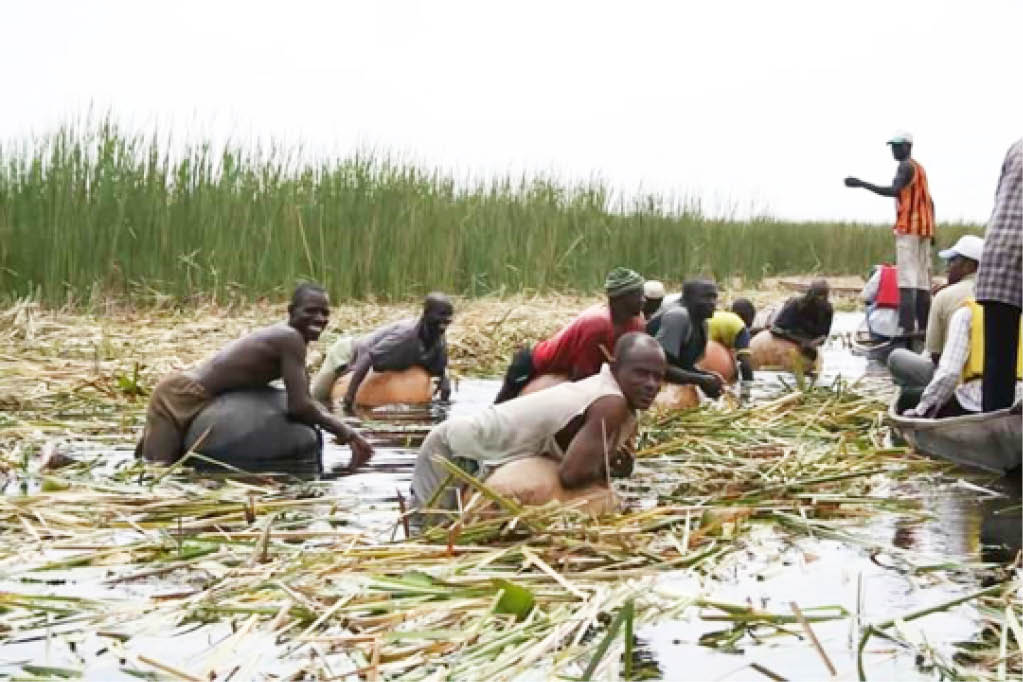Typha grass hinders Nguru wetland economic pontetials
Years back, the Nguru wetland was the toast of many residents of the ancient town and adjoining villagers. It provided a source of income to many farmers and fishermen as well as being a source of their many herbal medicines. The area also attracted tourists who came to watch the beautiful scenery. Sadly, all these […]

Group of fishermen in typha grass-infested pond
Years back, the Nguru wetland was the toast of many residents of the ancient town and adjoining villagers. It provided a source of income to many farmers and fishermen as well as being a source of their many herbal medicines.
The area also attracted tourists who came to watch the beautiful scenery.
Sadly, all these are becoming history as the area has been overtaken by the typha grass which allows little farming and fishing activities to take place.
Ali Sani, a rice farmer, said in the past, most of them relied on the wetland as their source of income to cater for their needs and the family.
“We see Nguru wetland beyond natural resources but a blessing naturally endowed on us and opportunity for us to venture into sustainable agriculture,” he stated.
He said the wetland is now overwhelmed by the dangerous weed, Typha grass, and it has reduced the agriculture potential of the land to barest minimum.
Abubakar Muhammad Muktar, an environmentalist based in Yobe, who conducted several researches on the wetland has estimated that it was supporting about 1.8 million people, comprising farmers, herders and fishermen in Yobe and Jigawa States.
“The wetland covers around 58,100 hectares of land with fresh water that supports the growth of many bio-resources such as medicinal plants and fruits-bearing trees (economic trees)”.
He said thousands of bags of rice, wheat and maize as well as substantial quantities of vegetable were being cultivated and harvested yearly through irrigation.
He also said thousands of wetland birds, herds of cattle, and flocks of sheep also pasture around the Nguru-Hadejia wetland, especially during dry season.
“The wetland is important to the survival of the people, and is contributing a lot to the GDP of the country.
“The typha grass invasion has led to the relocation of another dangerous species of birds called koala birds which easily destroyed crops which affected the socio-economic lives of the people around.”
He said the last time any government official visited to assess the situation was in 2017 when the then Minister of Environment, Amina Mohammed, visited.
“Since then, we never heard about the issue to save the wetland and that of the socioeconomic activities of the surrounding communities.”
Abubakar said earlier the Presidential Initiative on the North East had given out a contract to clear the grass but the job was yet to be executed.
The Chairman of Nguru Fishers Association, Mallam Garba Wakili, appealed for government’s intervention to save their means of livelihood.
“We have experienced serious setback in fishing activities compared to before; the invasion of typha grass, otherwise known as kachala grass, has blocked water flow to our fishing points, making it difficult for us to have more fish in the wetland”
According to him, the situation has rendered many fisher men jobless while some have migrated to the neighbouring state of Taraba in order to continue with their fishing activities.
He said in the past, some of the fisher men in the area could catch about 10 baskets of fish while big catchers like him could catch one boat of fish on a daily basis.
Wakili said previously, he used to generate about N5,000 to N10,000 daily but now he hardly can make N500 naira in a day.
He lamented that the problem has got to the extent that fisher men could no longer rely on fishing solely to feed their families as they switched into other businesses.
However, he said little efforts were made by an NGO and the federal government but even that was stopped half way.
Mr Harry Hanson, an official with Nigerian Conservation Foundation (NCF), an NGO working on Hadejia-Nguru wetland conservation project, has said his organisation has performed its role to stop the spread of the grass in the wetland.
He said the organisation has been mobilising resources through partnership with international, national and government organisations in the reclamation of the wetland.
